Communication and Media
UCAS code P900
- Study mode
- Full-time
- Duration
- 3 years
- Start date and application deadlines
-
- Start date
UCAS code P900
The world we live in is dominated by media in many forms. From entertainment and culture, through news and social media, to politics and promotion: the media shapes our understanding of what we know and what we consume. Whether you want to work in one of these areas, to research their impact or simply to understand more about our relationship with media, this programme provides a thorough introduction with plenty of opportunities to develop specialist skills.
During your first year, you will develop your foundational understanding and academic skills through core modules in media, communication and language.
As your degree progresses, you will have the opportunity to tailor your studies through a wide range of optional modules in topics such as political communication, screen media, virtual worlds, digital cultures, media writing, language and public relations. These options will allow you to pursue your own interests and focus on particular media and communication forms, analysing how they are organised as text, how they represent the world to us and ourselves to the world (from global power politics to constructions of individual identity), and how the media industries are organised to produce and profit from them.
In your second and final years, a suite of dedicated modules will teach you to acquire strong research skills, which you’ll be given the opportunity to put into practice through independent or collaborative research. Our final year module ‘Viral Video’ enables students to develop practical skills in videomaking. Check out their efforts on our dedicated YouTube page, or search ‘Media/Pool’.
All of our single honours programmes share a common first year consisting of four compulsory modules, giving you the flexibility to change to another one of our programmes at the end of your first year.
Year in industry
This programme is available with an optional year in industry. If you choose this option, year three is spent on a paid placement within an organisation in industry, broadly defined. You will be supported by the School of the Arts and the Department throughout, and your reflexive written account of the experience will contribute towards your final degree result. If you wish to study this programme with a year in industry, please put the option code ‘YI’ in the ‘further choices’ section of your UCAS application form.

We’re proud to announce we’ve been awarded a Gold rating for educational excellence.
Discover what you'll learn, what you'll study, and how you'll be taught and assessed.
Everybody who studies with us takes core Communication and Media modules in year one. These introduce key ideas and theories in Communication and Media and offer a basic understanding of many of the key areas of the subject in which you may choose to specialise later on. Besides introducing students to Communication & Media as a subject, our first year is designed to support you as you acquire and practice the academic and analytical skills you will need to succeed as a student and in your chosen career.
Programme details and modules listed are illustrative only and subject to change.
Your year two modules offer plenty of options, so you can begin to specialise in the areas which interest you most or which might prove valuable for your chosen career. For example, you can delve more deeply into film and the entertainment industry, the representation of self and society, or the interplay between global media and war. Or you can explore some of the practices associated with media writing and promotional media.
You will take two modules that will introduce you to academic research and support you to practice and develop your research skills.
Most of our year two modules are offered in 15-credit and 30-credit versions so, for simplicity, the list below only includes 30-credit versions.
| Compulsory modules | Credits |
|---|---|
| COMMUNICATION AND MEDIA RESEARCH I (COMM207) | 15 |
| COMMUNICATION AND MEDIA RESEARCH II (COMM208) | 15 |
Programme details and modules listed are illustrative only and subject to change.
Your final year offers an even wider range of options, designed to provide opportunities to specialise further in your chosen areas of the subject and to strengthen your employability and research skills. Some modules encourage you to deepen your understanding of the topics studied in year two, but you can also learn to study magazines and design your own, explore how media represent human rights issues or the environment, or discover areas as diverse as photography, strategic communication or queer film, for example. All of our students undertake a project involving their own sustained, research-based work in their final year, whether by taking the Dissertation module, collaborating on staff research, producing brief videos to client or by applying the skills you have learned by taking our Work Placement module.
Students must choose one of the following modules in the list below: COMM401, COMM342, COMM335 or SOTA300.
Programme details and modules listed are illustrative only and subject to change.
Media coverage represents the most important method for communicating key issues and developments in most subject areas to the wider world, so Communication and Media makes an excellent partner for 50:50 combinations with another subject of your choice. This means that you will find plenty of opportunities for crossover between your other subject and Communication and Media, but you will still study core modules from both. In Communication and Media, the full range of our modules will be open to you in years two and three.
Weekly lectures and seminar discussions may be supplemented by screening sessions, presentations and opportunities for group work where appropriate. We regularly invite expert speakers and practitioners to speak to our students about their work. Some modules also make use of our specialist equipment or software.
Dissertation and work placement modules involve more independent study, but always under the careful individual supervision of a member of academic staff.
We are committed to using a range of different forms of assessment, so types of assessment vary widely from module to module. Depending on your choice of modules, these may include coursework projects, essays, blogs, reports, literature reviews, writing exercises, presentations, online tests and unseen examinations.
We have a distinctive approach to education, the Liverpool Curriculum Framework, which focuses on research-connected teaching, active learning, and authentic assessment to ensure our students graduate as digitally fluent and confident global citizens.
The Liverpool Curriculum framework sets out our distinctive approach to education. Our teaching staff support our students to develop academic knowledge, skills, and understanding alongside our graduate attributes:
Our curriculum is characterised by the three Liverpool Hallmarks:
All this is underpinned by our core value of inclusivity and commitment to providing a curriculum that is accessible to all students.
The qualifications and exam results you'll need to apply for this course.
| Qualification | Details |
|---|---|
| A levels |
BBC |
| BTEC Level 3 national extended diploma |
DDM. |
| BTEC combinations |
BTEC National Diploma DM plus B at A level; BTEC National Extended Certificate M plus BB at A level. |
| Welsh Baccalaureate Advanced |
C in the Welsh Baccalaureate, plus BB at A level |
| Access |
Pass relevant Access to HE Diploma with 45 Level 3 credits with 27 at Distinction and 18 at Merit |
Studying with us means you can tailor your degree to suit you. Here's what is available on this course.
University of Liverpool students can choose from an exciting range of study placements at partner universities worldwide. Choose to spend a year at XJTLU in China or a year or semester at an institution of your choice.
Immerse yourself in Chinese culture on an optional additional year at Xi'an Jiaotong Liverpool University in stunning Suzhou.
Broaden your world by spending an additional year of study at a partner university abroad following your second year of study.
Take a semester of your second year of study at one of our worldwide partner institutions.
Spend a summer abroad on a study placement or research project at one of our worldwide partner institutions.
Year in industry placements give you an in-depth workplace experience where you can develop your skills and apply your learning.
You don't need to decide now - you can choose to add a year in industry after you've begun your degree.
Learn more about year in industry
To spend a year in industry, you'll need to secure a placement with an organisation. If you're unable to find a placement, you'll continue with the standard version of the course without a year in industry.
Every student at The University of Liverpool can study a language as part of, or alongside their degree. You can choose:
With a combined degree, you can study two subjects as part of the same degree programme.
Explore combined degrees for Communication, Film and Media courses
We are a friendly, close-knit Department with well-established systems to support you to make the most of your abilities. As such, we will get to know you and treat you as an individual, providing support and guidance from your very first day.
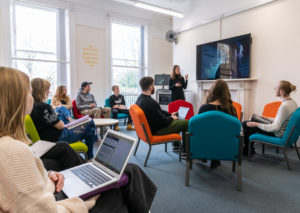
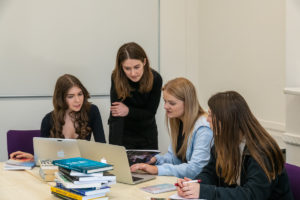
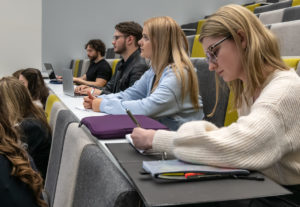
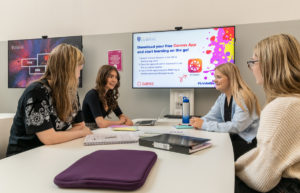

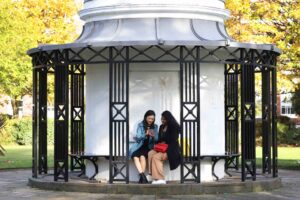
From arrival to alumni, we’re with you all the way:

What I've enjoyed most about the course is the research aspects, but also the modules and their relevance to contemporary issues.

Want to find out more about student life?
Chat with our student ambassadors and ask any questions you have.
Employability is incorporated throughout the programme, including within modules, through ‘real world’ assessment methods and at tailored events. Many of our modules seek to develop practical skills – such as media writing, blogging, analysis of social media data and video-making – alongside academic skills, and final year students have opportunities to undertake a relevant work placement or their own independent research.
Our graduates have gone on to careers including broadcasting, journalism, social media, advertising and marketing, corporate communications and public relations, arts administration, political campaigning (including political parties, trade unions and charities), management, government, and the civil service, as well as teaching in universities, colleges and schools.
Former graduates include a television documentary maker, a BBC Radio 1 DJ, senior journalists at local and national newspapers, a partner in a New York-based advertising company and the features editor of a music weekly.
94.9% of communications and media students will go on to work and/or further study 15 months after graduation.
(Discover Uni, 2018-19.)
Hear what graduates say about their career progression and life after university.

Joe Edge is a BA (Hons) Communication and Media graduate, now working as a Social Media Marketing Assistant at USP Creative in Liverpool.
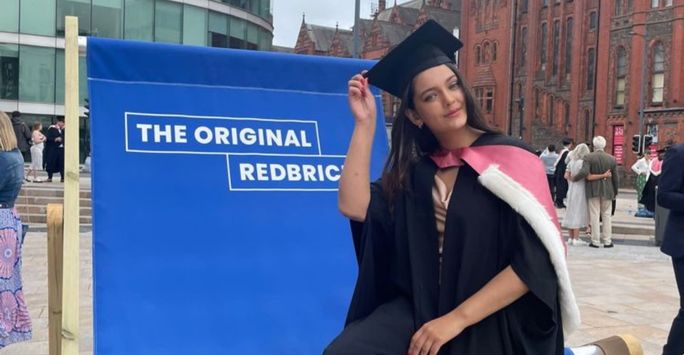
Mia Hargreaves, a recent BA (Hons) Communications and Media graduate, tells us more about her current graduate role.
Your tuition fees, funding your studies, and other costs to consider.
Full-time place, per year - £9,535
Year in industry fee - £1,905
Year abroad fee - £1,430 (applies to year in China)
Full-time place, per year - £24,100
Year in industry fee - £1,905
Year abroad fee - £12,050 (applies to year in China)
The tuition fees shown are correct for 2025/26 entry. Please note that the year abroad fee also applies to the year in China.
Tuition fees cover the cost of your teaching and assessment, operating facilities such as libraries, IT equipment, and access to academic and personal support. Learn more about paying for your studies.
We understand that budgeting for your time at university is important, and we want to make sure you understand any course-related costs that are not covered by your tuition fee. This could include buying a laptop, books, or stationery.
Find out more about the additional study costs that may apply to this course.
We offer a range of scholarships and bursaries that could help pay your tuition and living expenses.
If you’re a UK student joining an undergraduate degree and have a household income below £35,000, you could be eligible for a Liverpool Bursary worth up to £2,000 for each year of undergraduate study.
Apply for an Asylum Seekers Scholarship and you could have your tuition fees paid in full and receive help with study costs. You’ll need to have applied for asylum in the UK, or be the dependant of an asylum seeker, and be joining an eligible undergraduate degree.
If you’ve spent 13 or more weeks in Local Authority care since age 14, you could be eligible for a bursary of £3,000 per year of study. You’ll need to be a UK student joining an eligible undergraduate degree and be aged 28 or above on 1 September in the year you start.
Are you a UK student with a Black African or Caribbean heritage and a household income of £25,000 or less? You could be eligible to apply for a Cowrie Foundation Scholarship worth up to £8,000 for each year of undergraduate study.
If you’re a UK student identified as estranged by Student Finance England (or the equivalent UK funding body), you could be eligible for a bursary of £1,000 for each year of undergraduate study.
Joining a School of Biosciences degree and have a household income of less than £25,000? If you’re a UK student, you could apply to receive £4,500 per year for three years of your undergraduate course.
Do you live in the Liverpool City Region with a household income of £25,000 or less? Did neither of your parents attend University? You could be eligible to apply for a Nolan Scholarship worth £5,000 per year for three years of undergraduate study.
Are you a UK student with a household income of £25,000 or less? If you’ve participated in an eligible outreach programme, you could be eligible to apply for a Rigby Enterprise Award worth £5,000 per year for three years of your undergraduate degree.
Are you a UK student with a household income of £25,000 or less? Did neither of your parents attend University? You could be eligible to apply for a ROLABOTIC Scholarship worth £4,500 for each year of your undergraduate degree.
Apply to receive tailored training support to enhance your sporting performance. Our athlete support package includes a range of benefits, from bespoke strength and conditioning training to physiotherapy sessions and one-to-one nutritional advice.
Joining a degree in the School of Electrical Engineering, Electronics and Computer Science? If you’re a UK student with household income below £25,000, you could be eligible to apply for £5,000 a year for three years of study. Two awards will be available per academic year.
If you’re a young adult and a registered carer in the UK, you might be eligible for a £1,000 bursary for each year of study. You’ll need to be aged 18-25 on 1 September in the year you start your undergraduate degree.
Use our handy chatbot for your Clearing enquiries.
Last updated 1 July 2025 / / Programme terms and conditions